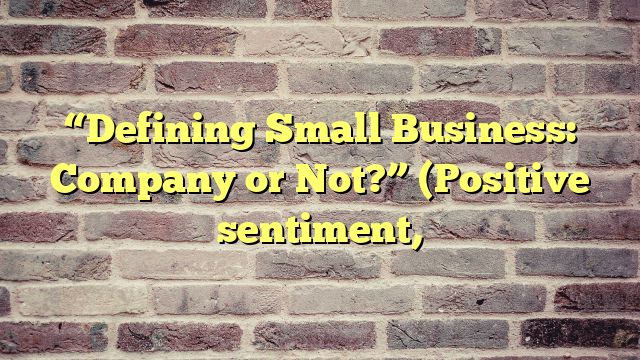Introduction
Small businesses are the backbone of any economy, providing employment opportunities and driving innovation. However, there is often confusion about what exactly constitutes a small business. Is it a company with a limited number of employees and a low turnover, or is it simply a mindset and approach to business? In this article, we will explore the definition of a small business and the different perspectives surrounding this concept.
What is a Small Business?
The most common definition of a small business is a company with fewer than 500 employees. This definition is widely accepted by government agencies and financial institutions. However, this number may vary depending on the industry and location. For example, the European Union considers a business with fewer than 250 employees as a small business, while in the United States, the threshold is 500 employees.
The mindset of a Small Business
Apart from the traditional definition, there is a growing trend towards viewing small business as a mindset and approach to business. This perspective focuses on the characteristics and values that differentiate small businesses from larger corporations. Small businesses are often associated with qualities such as flexibility, adaptability, and a close-knit work culture. They also tend to prioritize the needs of their customers and the community over profit.
Advantages of being a Small Business
There are many advantages to being a small business, both from a business owner’s perspective and a customer’s standpoint. Small businesses often have a more personal touch, allowing them to build strong relationships with their customers. This, in turn, leads to increased customer loyalty and word-of-mouth marketing. Small businesses are also more agile and can quickly adapt to changes in the market, making them more resilient in times of economic uncertainty. Additionally, small businesses tend to have lower overhead costs, allowing them to offer competitive pricing to their customers.
Challenges faced by Small Businesses
While there are many benefits to being a small business, there are also unique challenges that these businesses face. Limited resources and access to capital can make it difficult for small businesses to compete with larger corporations. They may also struggle with hiring and retaining skilled employees, as they may not be able to offer the same level of benefits and compensation packages as larger companies. Furthermore, small businesses may face regulatory and compliance issues, which can be time-consuming and costly.
The Impact of Technology on Small Businesses
With the rapid advancement of technology, small businesses now have access to tools and resources that were previously only available to larger corporations. This has leveled the playing field, allowing small businesses to compete more effectively in the global market. The rise of e-commerce has also opened up new opportunities for small businesses to reach a wider customer base and increase their sales. However, technology also brings its own set of challenges, such as the need for constant innovation and staying up-to-date with the latest trends.
The Importance of Supporting Small Businesses
As consumers, we have the power to support small businesses and contribute to their growth and success. By choosing to shop at local small businesses, we are not only supporting the local economy but also promoting diversity and creativity in the market. Small businesses also tend to have a smaller carbon footprint, making them more environmentally friendly. Additionally, by supporting small businesses, we are helping to create a more competitive market, which ultimately benefits the consumers.
Conclusion
In conclusion, the definition of a small business is not limited to the number of employees or the amount of revenue generated. It is a combination of factors, including mindset, values, and approach to business. Small businesses play a crucial role in the economy and offer unique advantages to both business owners and customers. While they face their own set of challenges, advancements in technology have opened up new opportunities for small businesses to thrive. As consumers, we have the power to support small businesses and contribute to their growth and success, ultimately creating a more diverse and competitive market. So, the next time you think of a small business, remember that it is not just a company, but a way of doing business.

